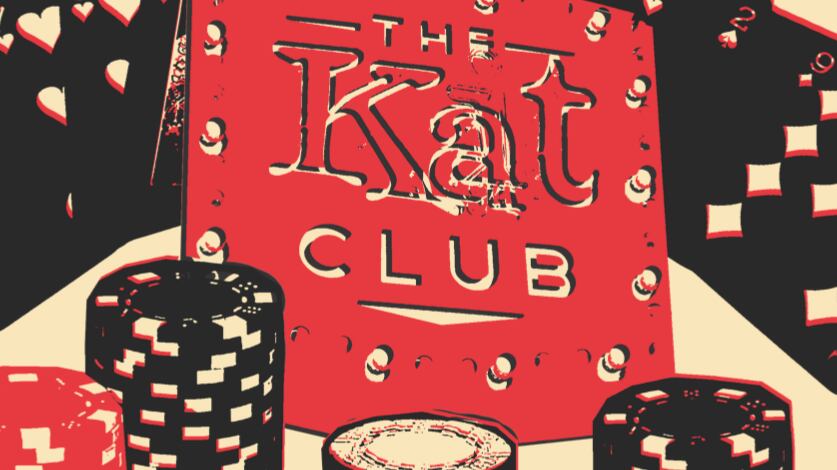This ain’t Texas, and nearing midnight at downtown’s longest-running poker table, there’s been shamefully little hold ’em. At the Kit Kat Club’s nightly game, novices are more tolerated than welcomed. Mastering the intricacies isn’t at all necessary for at least short-term success. But neither should the uninitiated expect to learn much from their experience beyond when to fold ’em, which is almost always.
I arrived at the Ankeny Alley strip club around 10 pm to find a handful of guys studying their phones around a hexagonal felt-top table and half-full pint glasses. Imagine the morning after the world’s saddest frat party, and have that last 30 years. I’d just assumed the evening’s table had disbanded, but such terms rather miss the point. As with the bones of any decent addiction, games may lie dormant but never quite end, and reassert themselves for the flimsiest excuse: my $10 door fee and $50 minimum buy-in, say.
Though slow to begin—one friendly gent offering his services as dealer—the pace of play steadily increased toward an internal cruising momentum just a bit too fast to ask any questions about the relative worth of certain hands or when bids are demanded.
Despite a constant concern over dwindling chips and escalating thirst, I did not count my money while sitting at the table, largely because there wasn’t sufficient time between the unending succession of bids to turn away. My tablemates, meanwhile, appeared happy just playing with theirs—the man mountain to my right shook his pile back and forth like a castanet, another repeatedly spilled chips along the table and deftly retrieved them as a lockstep rhythm developed in concert with the smooth R&B soundtrack and cards laid down.
By the time “Town Without Pity” nudged my moment of clarity, I realized I hadn’t moved or even looked away from the table for over an hour. That’s alarming under any scenario. When an unoccupied bartender is just 5 feet away and a gorgeous dancer is propelling herself up a pole via Cirque du Soleil-styled wizardry, losing oneself to the sheer momentum of poker makes one rethink one’s chosen vices.
A surprisingly expansive gentlemen’s club built around the former stage of ’90s indie mecca Berbati’s Pan, Kit Kat Club has played dissolute corollary to neighboring Voodoo Doughnut ever since co-owner Frank Faillace (Dante’s, Lucky Devil, Star Theater, Devil’s Point) imagineered a seedily chic aesthetic long on dark wood and wrought-iron flourishes. Hidden within a sliver of Southwest Ankeny Street, the bar doesn’t quite slink beneath notice, but neither does it particularly advertise its presence save for a small, broken neon sign that has flashed only “Kat Club” the past few months, contentedly misunderstood.
In other words, it was a seamless fit for the poker game recently transplanted from its longtime home within the Jockey Club’s nearby off-track betting-turned-karaoke parlor adjoining pool hall Rialto several months ago, though the bar has technically nothing at all to do with what goes on at the table.
State regulations do not allow establishments to profit directly from games of chance save those overseen by the Oregon Liquor and Cannabis Commission (that is, Keno and video poker). For most of the 20th century, cardrooms essentially meant blackjack, and the restrictions were intended to prevent casinos.
The distinctions essentially escaped notice until the early ’00s Texas Hold ’Em boom captivated the nation and forced a slight tinkering with Portland’s social gambling codes to permit barroom poker tables—so long as the gaming was managed by private parties. Local advocates swear municipal statutes have blessed Portland gamblers with an enviable variety of options, unable to demand a cut for the house (typically 5%–10% of each pot).
“I always had a natural fascination with probability-related card games and craved the social aspect,” local roots doyenne and House of Cards Music booking agency co-founder Jen Bernard told WW via email. Last year’s fourth-place winner in the Ladies International Poker Series championships, Bernard arrived in Portland in the early 2000s as a working musician and “fell upon a poker-playing crowd hosting $20 tournaments atop the Irving Street Lofts” as the “obsession gateway.”
She chooses her tables carefully and typically prefers the new breed of ginormous gaming emporia (Portland Meadows, Final Table) that “feel more like a hybrid between bowling alley, sports bar and bingo hall.”
Much as the expanding options now allow players to select gambling dens based on aesthetics alone, the community itself remains relatively small and, for such a cutthroat pastime, overwhelmingly supportive. Although the Kit’s Kat’s “underground vibe” never appealed to her, Bernard immediately recognized my description of the older gent serving as our table’s dealer and unreservedly recommended his services. They’re Facebook friends, of course. “The poker community is a kind of a safe space for people who don’t fit in elsewhere, and I think that’s why I immediately gravitated to this like-minded nerd tribe of similarly obsessed friends,” she said. “There’s tons of crossover with my other milieu of creative weirdos—our own island of misfit toys.”
If the Kit Kat clientele appeared to draw from a rather smaller array, rain-swept Sunday nights near bar close aren’t best bets to showcase diversity anywhere. Save for one bored dancer lounging near table’s end, all were white men near enough middle age with stylistic choices separated cleanly among (1) guys trying to look like Max Verstappen, (2) guys failing not to look like a badly disguised Louis CK, and (3) guys who might well be lab-spawned variants of Uncle Kracker sent off to provide a drolly stolid presence safeguarding the nation’s cardrooms.
When our CK Two briefly came undone upon losing a marathon hand to the dumb luck of a distracted competitor, flinging cards and threats, the Kracker-manque seethed caution around the table while tempering house security’s response with a gesture and, by extended glance, shaming the card flinger into immediate withdrawal and apologetic return. “We know the guy,” the dealer would later not quite explain. “He’s going through a divorce. This isn’t him.”
Considering most shootout competitors know one another solely from directly battling over money in a zero-sum game, the surprising affection shown by putative opponents feels sorta sweet and wholly unexpected. An empty gesture from people prone to impeccable bluffs, perhaps, but nobody romanticizes poker quite like die-hard players already committed to the late game. Concentrating on anything so intently till the wee small hours becomes a wearying ordeal best understood by fellow travelers. Where movies portray the elongated, ruinous hand bankrupting all others as this operatic affirmation of divine hierarchy—akin to slo-mo gunfights—the table resembles more the blood-spattered embrace of punch-drunk heavyweights clinging to one another after the final bell. Maybe, as its broken neon signage insisted all along, there is no “i” in Kit Kat Club.
“Poker players come from all walks of life, all ages, all religions, all sexualities,” Bernard said. “Someone with a fifth-grade formal education can have a better inherent sense for poker than Harvard professors, and there’s this cool, natural equality when everyone’s money is on the table. We’re all fighting the same variance, dodging the house rake, and learning at every step: strategically, economically, socially. Weird to feel this way about a game, but I do love poker.”

